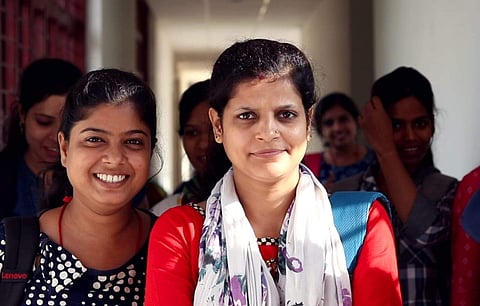

Hailing from Chidri, Karnataka, Suhasini Dhanraj was an Assistant Professor at Guru Nanak Engineering College, Hyderabad and taught BTech students, but her wish was to work in a corporate firm as she has always been interested in cybersecurity. Then there is GR Keerthana from Gudiyattam in Tamil Nadu. She pursued Computer Science, but wasn't able to secure a job. What proved to be a game-changer for Suhasini, Keerthana and over 500 women like them is that they opted for CyberShikshaa, an initiative from Microsoft India and Data Security Council of India (DSCI). It's a four-month course is targetted at women between 21 and 26 from small towns. Ministry of Electronics and IT (MeitY) is on board too as a partner and with them, CyberShikshaa provides a nationally recognised certification at the end of the course armed with which, they can aim for jobs with other graduates.
CyberShikshaa has been a boon! These are not our words, but the trainees'. “The CyberShikshaa course has been very helpful for me to get a job in HCL. This course has given me more confidence to work and has helped me to learn many things too,” says Keerthana. Similarly, Suhasini tells us how she stumbled upon CyberShikshaa. “Actually I want to work in the corporate field so I searched on social media to find out which is the best course for me in the digital world, I thought cybersecurity would be the best so I had chosen the same one.” Manju Dhasmana, Director of CSR, Microsoft India takes us through CyberShikshaa and tells us how they start up-to-date with the changing times. Excerpts:
Take us through the four-month course and what was the process of making sure that the curriculum remains as industry-relevant as possible? Is it periodically upgraded to suit the changing needs?
While India produces roughly 1.5 million engineer graduates each year, less than 30 per cent of them are women and many find it hard to get jobs. Research also shows that India’s cybersecurity market has been growing at a rapid pace, but women still only make up around 11 per cent of the sector’s workforce, both in India and globally. Keeping this in mind, we wanted to design a course to create very strong career pathways, especially for young women to thrive in the technology space.
The curriculum of the four-month course focuses on building competencies in cybersecurity. The course also helps prepare women students for any possible challenges that they may face in their professional careers. The modules have been designed keeping in mind the industry requirements and job roles that are in demand in the cybersecurity ecosystem. The course curriculum will also be updated regularly to ensure it is relevant to the evolving market requirements.
2) After the course, do the girls also get assistance in searching for jobs? We do know that the trainees are taught certain soft skills as well. Which ones are they?
Yes, the candidates receive extensive placement assistance in addition to the skills that prepare them for the recruitment process. These include presentation skills, oral and business communication skills that are essential to thrive in a professional environment. We feel that imparting these skills are critical to build the foundation of their professional journey, as most women taking the course might be the first person in their family to join a corporate. Students will also receive nationally recognised certification, on completion of the course, which encourages them to compete for jobs on an equal footing.
Cyber security has been a rising concern, especially during this lockdown. How does the course prepare the girls for the rising challenges in the field?
The COVID-19 pandemic has increased our reliance on technology. With many of us connecting remotely for work or education, the security profile of organisations and users has become more vulnerable. This has created a huge demand for a skilled cybersecurity workforce who have the technical know-how to combat such challenges. The curriculum has tools which helps candidates to develop the technical knowledge about cyberattacks, phishing and malware threats. Moreover, sessions by various industry experts also gives them the opportunity to get mentored on skills that are in-demand and relevant in the current scenario.
Started two years ago, CyberShikshaa has been the brainchild of Rama Vedashree (CEO of the DSCI) and you. In retrospect, have you started to achieve what you set out to do through it?
I feel incredibly proud of what we have achieved, so far. The fact that more than 500 women have already graduated truly reflects the impact of the programme. As a technology leader, we at Microsoft felt that it was incumbent on us to create very strong career pathways, especially for young women to join the technology sector. We’re glad that the programme has received support from the government and other corporates who have hired our trainees. This has encouraged many girl students. Having said that, this is a long journey and we still have a lot to do in terms of building a stronger ecosystem in the country, creating awareness on cybersecurity as a career option, and changing mindsets about technology careers for women. We wish to collaborate with more organisations, going forward and foster the next generation of women cybersecurity experts in the country.
